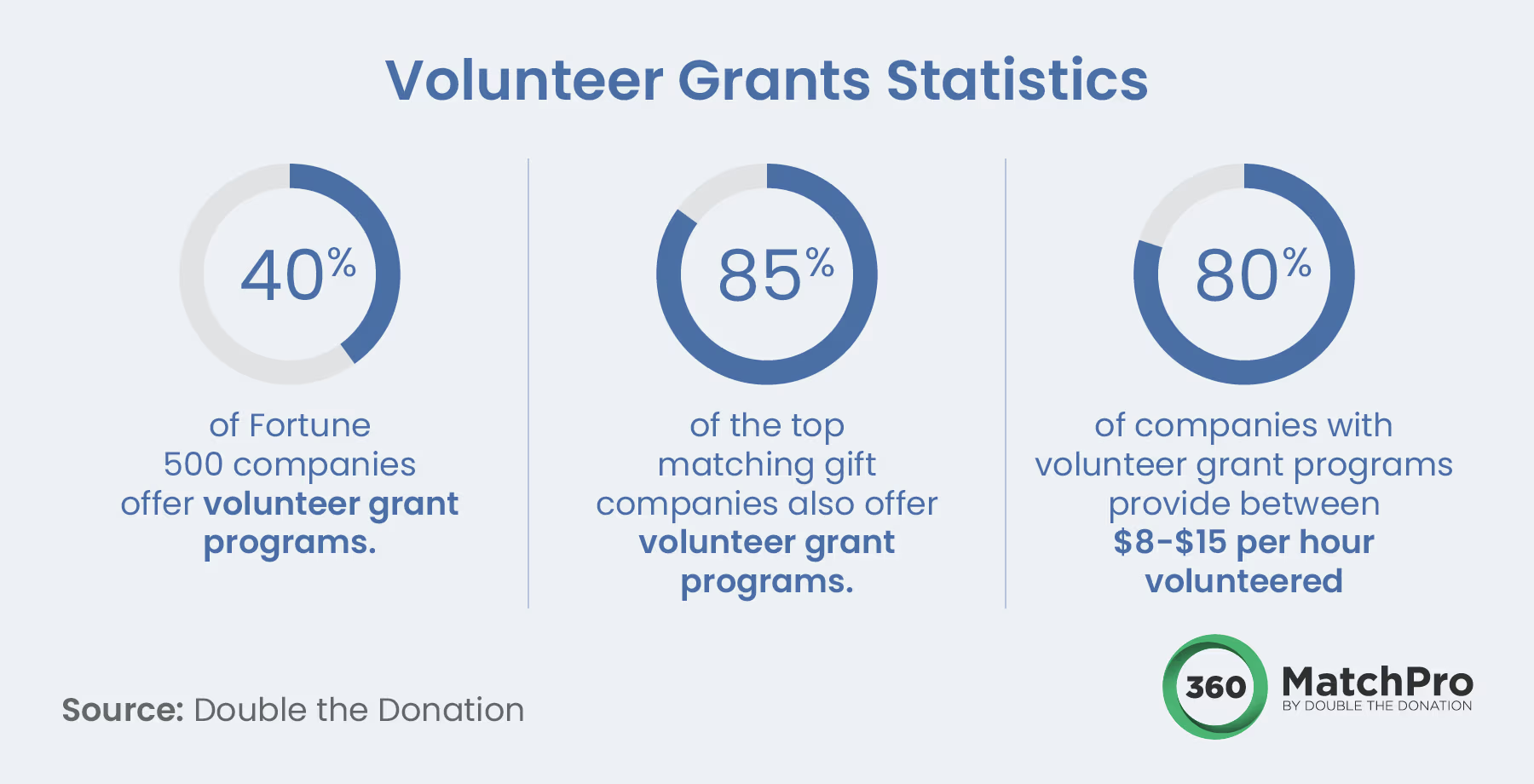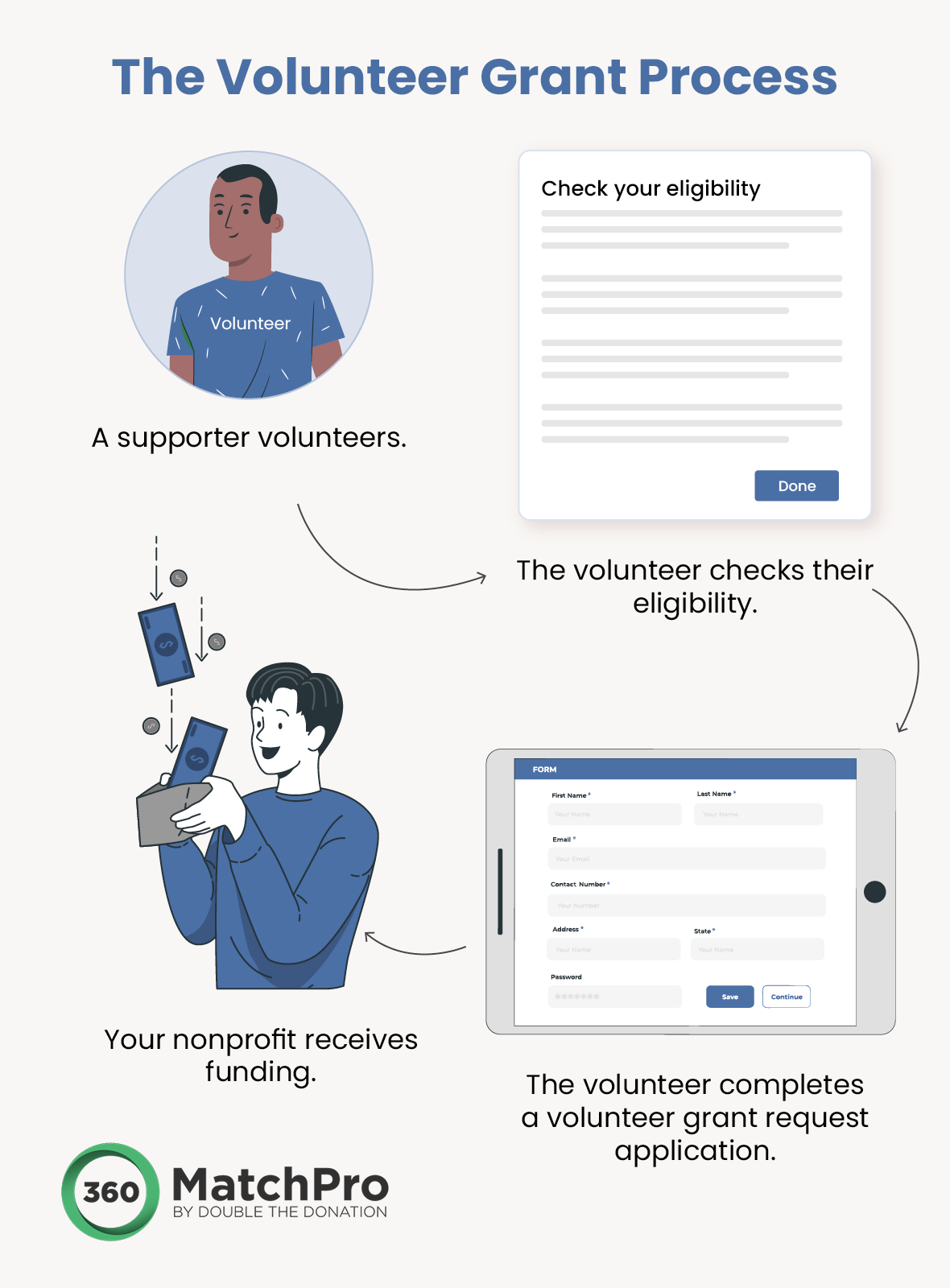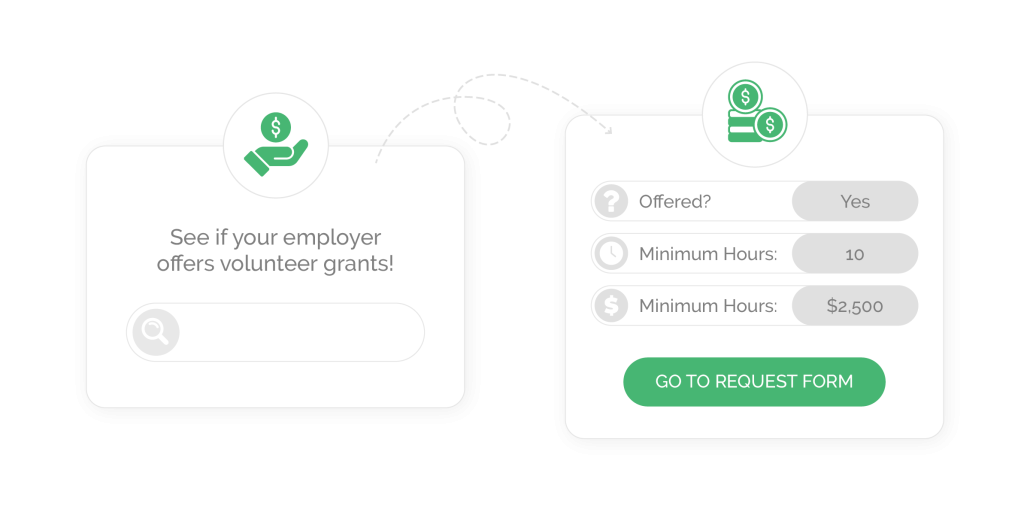Volunteer Grants: Get More Out of Your Volunteer Program
Your nonprofit’s volunteer program provides immense value to your organization, whether your supporters help run events, participate in fundraisers, or work on programs that fulfill your mission.
Thanks to corporate volunteer grants, your nonprofit can earn even more value from these programs completely for free.
However, reports show that just 3% of eligible supporters participate in volunteer grant programs, meaning your nonprofit needs to take active steps to engage supporters in this opportunity. To help your nonprofit maximize your volunteer grant revenue, this guide will explore:
- Volunteer Grant FAQ: Understanding the Basics
- The Volunteer Grant Process: A Step-by-Step Overview
- 5 Leading Volunteer Grant Program Examples
- Leveraging a Volunteer Grant Database
The first step to earning free revenue from your volunteers is to educate your team about these opportunities. That being said, let’s answer a few common questions about volunteer grant programs.
Volunteer Grant FAQ: Understanding the Basics
What are volunteer grants?
Volunteer grants, also commonly referred to as Dollars for Doers, are a type of corporate giving program wherein businesses donate to the nonprofits their employees volunteer with. Usually, these donations are based on the number of hours an employee volunteers.
For example, Business A might agree to donate $250 after an employee volunteers for 25 hours. In contrast, Business B donates $15 for every hour an employee volunteers.
Along with unique program structures, every company also has its own eligibility criteria and grant application process. As such, your nonprofit can’t account for every type of volunteer grant program, but with the right tools and a passionate volunteer base, you can claim as many volunteer grants as possible.
What are the benefits of volunteer grants?
For nonprofits, there really is no downside to volunteer grants. By encouraging supporters to seek out these opportunities, your organization can gain:
- Additional revenue. Volunteer grants are essentially free money. When an eligible supporter volunteers, they can claim additional revenue for your nonprofit at no personal cost. This allows them to support your nonprofit monetarily without actually spending any of their own money.
- Improved retention. Many volunteer programs require employees to donate a certain amount of their time. As a result, some volunteers may feel incentivized to continue volunteering to reach their minimum or maximum volunteer grant hours threshold.
- New business connections. If several of your volunteers work for the same employer, that company might take notice of your nonprofit and establish a dedicated giving program. This can help you get a foot in the door with businesses, leading to sponsorships and additional corporate support.
Plus, volunteer grants also benefit the companies that issue them. Corporations offer these programs to engage employees by supporting the same causes they do and encouraging them to make an impact in their local communities. As a result, employees are more likely to stick with their employer and speak positively about their social impact efforts.
How common are volunteer grants?
Despite low participation rates, volunteer grant programs are actually widespread. Here are a few stats to know about volunteer grants’ popularity:

- 40% of Fortune 500 companies offer volunteer grant programs.
- 85% of the top matching gift companies also offer volunteer grant programs.
- 80% of companies with volunteer grant programs provide between $8-$15 per hour volunteered.
In other words, volunteer grant programs are not only popular but they’re often supplemented with other employee giving initiatives like matching gifts and can vary widely in grant amounts.
Is my nonprofit eligible for volunteer grants?
Every company has its own unique volunteer grant requirements. However, we can provide a few general eligibility guidelines:
- Organization type. Some businesses may only recognize volunteer hours at nonprofits with specific focus areas. However, most programs are willing to support almost all types of registered 501(c)(3) nonprofits and educational institutions. Common exceptions to this include political and religious groups.
- Employee eligibility. Which employees are eligible for a volunteer grant depends on the business’s guidelines. Some programs are only open to full-time employees, whereas others offer grant awards to part-time and even retired employees.
- Hours volunteered. Volunteer grant programs usually base their awards on the number of hours volunteered. As such, many programs require employees to hit a minimum number of hours before donating. On the other hand, volunteer grant programs also often have hours or grant payout maximums per employee per year. Employees who hit their hours or grant award ceiling are still welcome to volunteer, but they are no longer eligible for a volunteer grant until the next year.
Also, be aware that almost all volunteer grant programs have deadlines by which employees must submit their grant application requests. This incentivizes employees to report their volunteer hours efficiently and avoids situations where companies have to verify volunteer shifts that happened multiple years ago.
The Volunteer Grant Process: A Step-by-Step Overview
While volunteer grant program requirements vary, most grants will follow the same submission process. For most of your volunteers, they’ll need to follow these steps:

- A supporter volunteers. Supporters should volunteer like normal. This can include volunteer roles they signed up for independently of their workplace as well as organized corporate volunteer activities. Regardless, maintaining a record of volunteer hours as an accurate count will be necessary for the grant application, and the right corporate volunteering platforms can help!
- The volunteer checks their eligibility. Many companies with volunteer grant programs do not regularly promote them to employees or even mention them much outside of initial recruitment. As such, your nonprofit will need to encourage volunteers to check their eligibility. We’ll explore tools that can streamline this step later.
- The volunteer completes a volunteer grant request application. Eligible volunteers will need to fill out a grant application after reaching their employer’s minimum hours threshold. These applications usually ask for details about your nonprofit, such as your organization’s name, mission, and contact information. Additionally, as most program awards are based on hours, they’ll ask for the amount of time volunteered as well as how the business can reach out to your nonprofit to verify the hours reported.
- The employer reviews the application. Businesses vary in how intensely they review grant applications. Some may trust employees’ reporting and approve grants with little follow-up, while others may contact your nonprofit with additional questions about your mission and volunteer program.
- Your nonprofit receives funding. Once the application is approved, your nonprofit will receive funding. Often, these payments will come from the business’s CSR software vendor rather than the businesses themselves. Also, be aware that many companies review grant applications on a quarterly or even annual basis rather than right when they come in.
After a volunteer submits a grant application, be sure to thank them! This step is optional, but showing appreciation increases the chances that the supporter will continue to volunteer with your nonprofit and complete future volunteer grant requests.
5 Leading Volunteer Grant Program Examples
We’ve already mentioned that volunteer grant programs are widespread. To give you an idea of just how common these programs are and what they look like in practice, here are a few top companies that offer volunteer grants:
- Microsoft has no minimum hours requirement for its employees, meaning staff can request $25 for every hour they volunteer at eligible 501(c)(3) organizations.
- Verizon encourages its employees to volunteer at multiple nonprofits by providing each current employee with two $750 grants per year when they volunteer 50 hours at a nonprofit. This means employees can donate $1,500 total for free each year.
- CVS Health provides both individual and team volunteer grants. For individual employees, CVS offers volunteer grant tiers of 15-25 hours = $500 grants, 25-100 hours = $1,000 grants, and 100+ hours = $1,500 grants. When teams of five or more CVS employees volunteer together for a combined total of 50 hours, they can earn a $2,500 volunteer grant.
- Allstate Insurance offers employees and agency owners volunteer grants through its “Helping Hands Grants” program. Employees need to volunteer just eight hours at one nonprofit to earn a $500 grant. Then, if they volunteer another eight hours, they can earn a second $500 grant, for a total of $1,000 in volunteer grants every year.
- Disney offers employees its “EARS to You grant” program. Through this initiative, Disney provides volunteer grant tiers based on the number of hours volunteered per year: 10-24 hours = $100 grant, 25-49 hours = $250 grant, 50-74 hours = $500 grant, 75-149 hours = $1,000 grant, 150+ hours = $2,000 grant.
These few examples show how volunteer grant programs can vary in numerous ways, from hour requirements to team programs to annual limits. Given the sheer variety of requirements, nonprofits can best help their supporters apply for volunteer grants by investing in a volunteer grant database.
Volunteer Grant Database
Volunteer grants are an underutilized resource for nonprofits because so many supporters are unaware of whether they’re eligible for a volunteer grant. Fortunately, there is a solution to this problem: a volunteer grant database.
This type of tool lets your volunteers look up their employers and discover their unique program requirements. When it comes to volunteer grant databases, we have to recommend our comprehensive platform, 360MatchPro.
While 360MatchPro traditionally focused on corporate matching gift programs, Double the Donation has expanded its product to target corporate volunteer incentives (like volunteer grants!) as well. This one-of-a-kind solution, called Double the Donation Volunteering, is available to existing Double the Donation users, providing an easy way to uncover volunteer program opportunities and more.

All supporters need to do is enter their employer’s name into the search tool to get paired with both their matching gift and volunteer grant information. Along with learning if their employer offers a volunteer grant program, 360MatchPro will also provide details about:
- Hour requirements. 360MatchPro can answer all of your volunteers’ questions about their employers’ unique hours requirements. Whether a business has no hours requirement, a minimum floor, or hour tiers, 360MatchPro has all the information ready to share with your supporters.
- Amount offered. 360MatchPro can tell your volunteers how much their employer will award them per hour volunteered or after reaching a set amount of volunteer hours.
- Grant information. Our database provides detailed information about companies’ volunteer grant programs, including how to apply, what types of nonprofits are eligible, and grant tiers. Additionally, 360MatchPro can alert employee donors to other details about their employers’ volunteer programs, such as if they have a volunteer time off policy.
- Contact information. If your nonprofit or a supporter has any questions about an employer’s volunteer grant program, 360MatchPro provides details about how to get in touch with their corporate giving support team.
Your nonprofit can also leverage 360MatchPro’s volunteer grant database to discover supporters’ employers and alert them about corporate giving opportunities. Plus, after you identify eligible supporters, our automated email streams can keep you in touch with every volunteer and encourage them to see their grant requests through to completion.
More Volunteer Grant Resources
Volunteer grants are free revenue that your volunteers can provide just by filling out a form. To start earning funding from this underutilized resource, inform your volunteers about volunteer grants and provide them with the tools they need to research their eligibility and complete their employers’ application process.
For even more resources related to volunteer grants, check out these guides:
- Top 10 Volunteer Grant Companies: Increase Corporate Dollars. Help your volunteers discover their eligibility for volunteer grants with this guide to volunteer grant companies.
- Top 20+ Matching Gift Companies: Leaders in Corporate Giving. Matching gifts have a lot in common with volunteer grants, and many of your donors may be eligible for them. Learn more in this guide to matching gift companies.
- How to Unlock More Social Impact With Corporate Philanthropy. Interested in taking advantage of other corporate philanthropy programs? Check out this guide to corporate giving.





